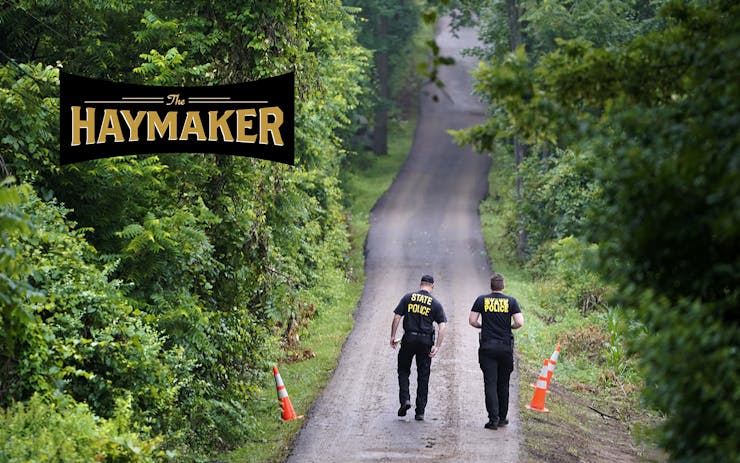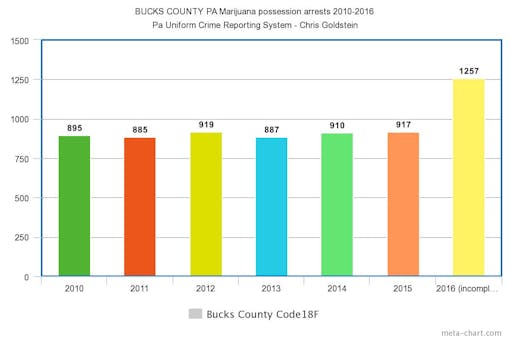‘The Haymaker’ is Leafly Deputy Editor Bruce Barcott’s weekly column on cannabis politics and culture.
Mark Sturgis and Thomas Meo would be alive today if they lived in Nevada. They would be enjoying the summer sunshine if Oregon were their home. Or Washington. Or Colorado. Or Alaska.
Had they lived in a legal state, Mark Sturgis and Thomas Meo would still be alive today.
But Sturgis and Meo had the misfortune to reside in Pennsylvania, where marijuana remains illegal. So today their families are grieving and law enforcement officials are investigating their gruesome murders in Solebury Township, a small town in rural Bucks County, north of Philadelphia.
Sturgis and Meo were two of the four young men who went missing in Bucks County shortly after the July 4 holiday. After a statewide search, their remains were found last week in a deep grave dug by a backhoe on a farm belonging to the parents of 20-year-old Cosmo DiNardo. DiNardo and his friend Sean Kratz were arrested and charged with murder last Thursday. Later that day DiNardo confessed to participating in all four killings in a plea deal that spared him the death penalty.
Video of defense attorney Paul Lang’s statement that Cosmo DiNardo confessed to his involvement with the murder of four Bucks County men. pic.twitter.com/3mcdXPfSx0
— James Boyle (@jamesboylejr) July 13, 2017
The outlines of the crime, as alleged by state law enforcement officials, are appalling in their cruelty and stupidity.
As Joel Achenbach and Mark Berman reported in the Washington Post:
Authorities described a scenario that was repeated three times in early July: The young men were lured to the farm with the promise of marijuana deals, they were shot — one was also run over with a backhoe — and then they were buried on the private property in holes dug with the backhoe. Three of the bodies were put in a large tank, set ablaze, and then dumped into a deep grave, authorities said.
The first to die, according to authorities, was Jimi Patrick, a 19-year-old Loyola University student. Two days later Dean Finocchiaro, also 19, was allegedly killed on the farm. Later that night DiNardo met up with Mark Sturgis, 22, and Thomas Meo, 21. Sturgis and Meo were seeking cannabis, which DiNardo offered to sell. They followed DiNardo to the farm and met the same fate as Patrick and Finocchiaro.
These are horrifying and senseless crimes.
They’re all the more outrageous because they didn’t have to happen.
DiNardo and Kratz, if the police reports are true, were clearly looking to kill. But if not for prohibition, at least two of their victims never would’ve fallen for their ploy.
Patrick and Finocchiaro were both under 21. But Sturgis and Meo were of age. In any of America’s five fully legal states, they could have parked Meo’s Nissan Maxima in front of a state-licensed cannabis store, browsed a wide selection of products, and driven home with their purchase. End of story.
But there are no cannabis stores in Pennsylvania, where prohibition remains in effect for everyone except medical marijuana patients (who as yet have no way to access medicine or register their status with the state; meaning they’re left to buy from illegal dealers, too). In fact, as Philadelphia reform advocate Chris Goldstein has reported, marijuana arrests actually spiked last year in Bucks County. From 2010 to 2015, local authorities averaged about 900 small-time cannabis arrests per year. In 2016, that number jumped to more than 1,250.
This chart, prepared by Chris Goldstein, originally appeared on Philly.com.
A Convenient Lure
Without a legal option, Sturgis and Meo sought their cannabis the old-fashioned way: By connecting with a sketchy local dealer, whom they agreed to follow to a creepy old farm out in Solebury Township.
DA: Cosmo DiNardo lured 4 men to their deaths by offering to sell them marijuana https://t.co/d7Kw2fm5FW via @couriertimes
— James Boyle (@jamesboylejr) July 14, 2017
Bucks County District Attorney Matthew Weintraub, according to the Post, “emphasized that law enforcement officials were not making any moral judgments about the slain men in outlining the marijuana deals police say were used to draw them in.”
Funny. When a man is horribly murdered while on his way to the Stop ‘N Shop to pick up a half-rack of Pabst, we generally don’t go out of our way to announce forgiveness for his errand of wicked intent. What does it say about law enforcement officials’ attitude toward marijuana that police have to explicitly state that they don’t blame the victim of a gruesome murder?
Residents and visitors to Colorado spend more than $100 million a month on cannabis products. During the first four days of retail cannabis sales in Nevada, consumers there laid down more than $3 million. Would the law enforcement officials of Pennsylvania care to make any moral judgments about them? Of course not.
Legality and the Illicit Market
Two of the victims in this case were under 21, so an adult-use law might not have prevented them from making a black-market buy. But it would have made it more unlikely. Adult-use legalization doesn’t eliminate the illicit market overnight. It starves and winnows back-alley sales channels slowly, over time. I know some consumers in Colorado and Washington who held on to “their guy” for months after legal stores opened. But that relationship usually ended after the customer’s first trip to a state-regulated shop, where the quality and choice make the dealer’s cheap baggie of shake seem like a ripoff. Most of those who held out ultimately abandoned the illicit market for state-licensed shops as market prices invariably fell.
There is no magic wand. Legalization doesn’t make every illegal cannabis seller disappear—but it does dry up demand to the point where the occupation of “weed dealer” becomes almost as rare as “booze dealer.”
Time to Rethink Prohibition
Back in January, reform advocate Goldstein asked incoming Bucks County Attorney General Matthew Weintraub how his office planned to handle the 1,000+ cannabis cases expected in 2017.
56% of Pennsylvanians now support full adult legalization.
“I think we’re going to handle it on a case-by-case basis,” Weintraub said. “There are occasions where we would seek to prosecute to the full extent, but a majority are negotiated to some sort of guilty plea.”
Goldstein pointed out that simple marijuana possession was the most-arrested drug related crime in Bucks County.
“It brings to bear a great question whether we are getting the best value for our prosecution and law enforcement manpower efforts in focusing on this or more serious crimes,” Weintraub replied. “Right now this is the law on the books and we will enforce it,” he said, though he promised to “look at this issue critically going forward.”
According to the latest poll published in May, 56% of Pennsylvanians believe cannabis should be legalized for all adults. Now might be a good time for that critical look.







